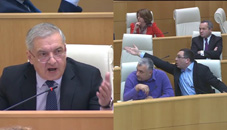
First meeting of the Parliamentary Council of Ethics focuses on organizational issues
By Natalia Kochiashvili
Thursday, June 13
The Parliamentary Council of Ethics held its first meeting to discuss organizational issues on June 12. The members of the Council considered questions related to the Ethics Council’s Statute and various processing documents, such as rules of adoption and review of complaints.
Irine Pruidze, MP from the ruling party and the member of the Parliamentary Ethics Council commented after the meeting: “We discussed what the Ethics Council’s Statute should be like and the main issues that we have to clarify. Also, forms of certain documents have to be developed, including a form of complaint, a form of recommendation card, gift registration form, and more.” According to her, it will take some time to elaborate the regulations and documents of the Ethics Council, and after approval of the regulation that is to be held at the autumn session, the Council will be ready to work in early September.
The Parliamentary Ethics Council was created this year by the Resolution of the Parliament of March 19. The number of the Council of Ethics is determined by 14 members, out of which 7 MPs belong to “Georgian Dream,” three - “European Georgia,” one is from “National Movement,” one from “Alliance of Patriots” and two of them are independent MPs.
Ethics Council should consider complaints about the alleged violation of the Code of Ethics.
The Council is also obliged to issue recommendations, and its meetings will be closed. At this stage, if the violation is confirmed, the only sanction will be publishing information on the website of the Parliament. Pruidze does not exclude other forms of sanctions.
Deputies who violate the Code of Ethics will not be restricted from abroad visits, and no penalty will be imposed. After the first meeting of the Council of Ethics, Pruidze said that based on consultations with the opposition the only sanction for the violator will be publishing his/her name on the website.
“In the first version of the Code of Ethics, there were three types of sanctions: recommendation card, fine and excluding from participating in visits, but then we agreed with the opposition to remove the two sanctions - at this stage, the Code of Ethics envisages only one sanction,” commented Pruidze.
The parliamentary opposition positively assesses the creation of the Council of Ethics, but they think that the Council will not make objective reactions to the controversy in the Parliament.
“If the majority doesn’t change the attitude of throwing mud when they are in the corner, the Ethics Council will not help,” said Giga Bokeria, member of “European Georgia.”
MPs from the ruling party assess the creation of the Council as well: “The council will be a restraining barrier for those who decide to display certain topics in such hate speech,” said Nino Tsilosani, a member of the parliamentary majority.
According to Tamar Chugoshvili, the Vice-Speaker of the Parliament, the Ethics Council is staffed so that the balance is maximally protected. According to her, the parliamentary majority in the Council is represented in a small number.
Before the meeting, predictions were made that the newly created Ethics Council of Parliament would be interested in the current incident that occurred between MPs.
The confrontation occurred between Gia Volsk, parliamentary majority member and Giga Bokeria, representative of “European Georgia” on June 11 at the plenary session of the Parliament. The noisy debate on the second round of elections in Mtatsminda district was followed by accusations when opponents reminded each other about their political past several times. Bokeria announced that member of the “Georgian Dream” Volski was a former instructor of Central Committee of the Communist Party of the Soviet Union (CPSU), Karlo Kopaliani studied at the Gorki Party School after April 9 and Guguli Maghradze was a member of the partial committee. In return, Volski remembered the criminal actions of the previous government and Bokeria’s team. The controversy continued outside of the hall.
However, Pruidze commented, that at this stage, it is impossible to discuss verbal confrontation in the format of the Ethic Council.
Chugoshvili also commented regarding the incident and the Ethics Council: “We tried to keep balance in staffing so that questions about impartiality do arise not. As for yesterday’s events, such scenes are very worrying. This is very damaging to the image of the institute. If MPs address the Council of Ethics, the precedent will gradually be established that such behavior is unacceptable and the parliamentary session hall is not a street.”


